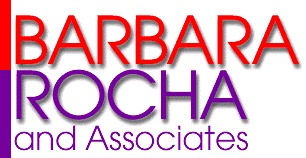Foiling Fear
by Barbara Rocha
Studies show that fear of public speaking is most people’s worst fear – worse than the fear of death, poverty, or total incapacity.
Really? People would rather die than speak in public? In fact, some toy with the idea of an accident or illness just serious enough to get out of a speaking assignment. I’ve had people in class who have told me they were less nervous on the battlefield than they were speaking.
That’s scary. And sad. Why? Because the fear is actually a choice for most people – an unconscious choice, but a choice, nonetheless. A choice by default.
Think of the fear of public speaking as the default margins in your computer: If you don’t set some other margin, you get the one already set in the machine -- the default margin.
So, how do you choose not to be afraid? If it’s so easy, why doesn’t everyone do it? And why do so many experts say you’ll always be nervous, and that if you aren’t you’ll be boring?
People don’t do it because they don’t know it’s possible. They assume nervousness is necessary and they just have to tough it out.
Here are two reasons why people say it’s necessary to be nervous in order to be good:
1. People assume because they’re always nervous that no one can get over it, and 2. they’re confusing happy adrenaline with fear adrenaline.
My adrenaline flows when I’m going to do things I look forward to. That’s happy adrenaline. I used to be nervous about speaking which lead to shaking knees and knots in my stomach. That’s fear adrenaline.
Remember, being nervous is only the default position; you don’t have to go with the default setting. Instead, you can choose to think about your ideas and how they will affect your audience.
As a diet commercial once said, “Once you change the head, the body’s easy.”
